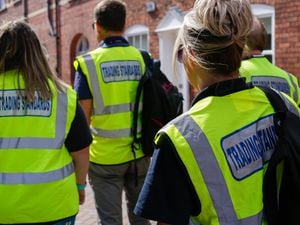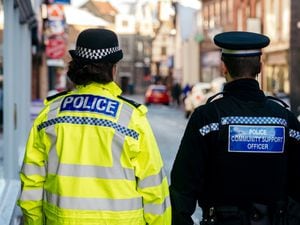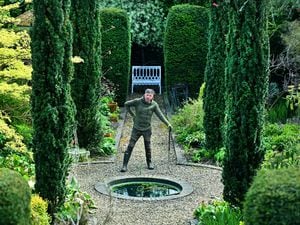Soldier Dennis' thoughts of home during bitter battles
For four years during the war Shropshire soldier Dennis Gwynne wrote regular letters home, always starting: "Dear Mum and Dad."

Then they received one where the "Dear Mum and Dad" was in unfamiliar handwriting – it had been written for him as he was in hospital having been blown up and partially blinded in the combat zone.
Dennis, part of a well-known Wellington legal dynasty, was a young officer who had already distinguished himself in action in desperate fighting against the Japanese in Burma and once he had recovered was presented with the Military Cross by General Sir Claude Auchinleck.
His fighting war was ended by a Japanese booby-trap, resulting in him losing an eye. For a long time after the war he suffered from nightmares and insomnia related to his experiences.
And now his letters home have been showcased in a new book edited by his great nephew, Mark Gwynne, who is son of former East Shropshire coroner Michael Gwynne.
"The letters were given to my father by Dennis’ widow, Pat Gwynne, some years after he died and then with me for the last five or six years and I put them away in a drawer," says Mark, who is 54 and can remember Dennis, who died in 1972, albeit barely.
"I read them all several years ago and found them fascinating, but it was really only when lockdown version 1.0 came along that I began to do something more with them, especially filling in the bigger picture and the context in which he was writing.
"So it really all started out as an archiving project and a point of family discussion and it just grew and grew from there as the source material was so good and so comprehensive.
"I certainly never got to talk about these things with him and I’m not sure he would have wanted to discuss them with me either in all honesty. I did discuss the letters with Pat and now of course I massively regret not asking her a lot more.
"As you know, once these things slip beyond living memory unless they are archived or recorded, it becomes so much harder to reconstruct anything meaningful on a human level.
"The one thing that did really strike me while I was doing this is that while the internet makes discovery and validation so much faster and more comprehensive, ultimately collections of letters like these will become much rarer in the future as email is just not the same.
"There is a suggestion now that the collection of letters and photos might go on display at the Soldiers of Shropshire Museum in Shrewsbury, where they can be seen. I hope this will happen as I think these accumulated collections of individual and local stories will outlive the statues."
Mark will be talking about the letters collection in an "in conversation" on November 27 in a free virtual talk hosted by the Soldiers of Shropshire Museum – formerly called Shropshire Regimental Museum – for which virtual attendance needs to be booked in advance.
Born in 1919, Dennis was articled at the family law firm, R Gwynne & Sons, which had been founded by his father Robert Gwynne in 1908. His wartime "Mum and Dad" letters are to Robert and Winifred Gwynne at the family home, Eversleigh in Mill Bank, Wellington.
Dennis was commissioned into the King's Shropshire Light Infantry in August 1939, service with the county regiment being a family tradition, and together with his older brothers Leslie and Norman was sent to India in 1942, although they did not serve there together.
He was transferred to the Gurkha Rifles and was soon heavily in action.
His letters show that even in desperate times his thoughts were of home in Shropshire, and through censorship and, no doubt, a desire not to cause alarm among his parents, only hint at the ferocity of the fighting.
"Am feeling a bit tired these last few days, having just come back from another show in which we had quite a bit of fun – maybe you will be hearing something about it soon," he writes on August 2, 1943.
The climax came when the Japanese launched a major offensive in Burma in March 1944 aimed at destroying British forces at Imphal and Kohima.
On March 12, 1944, he writes: "Never worry if you don't hear from me for a week or two at any time. It's sometimes absolutely impossible to write letters, but I always do when I get a chance. Very fit, though I feel a bit exhausted sometimes when the strain begins to tell."
Dennis, who had risen to the rank of Major and was ultimately a Lieutenant Colonel, was to be injured during the taking of the rural village of Potsangbam, or "Pots and Pans" as it was known by British troops, on May 14.
He learnt the news of his award of the Military Cross from his parents in February 1945. The medal was given for his leadership in a number of actions during early 1944.
"He is an outstanding Company Commander and by his leadership has imbued in his men the same fearlessness and determination which he, himself, shows on all possible occasions. In addition, he provides an inspiring example to all other officers," the citation concluded.
Dennis returned to England at the end of 1945 and it seems that he was for a time was commandant of a prisoner-of-war camp, possibly in Herefordshire, and Michael Gwynne remembers his uncle Dennis telling him that a high-ranking Nazi had escaped while under his command.
Dennis qualified as a solicitor in 1950, practising in Wellington. He lived at the family home until his marriage to Patricia Tristem in 1953. They had no children.
The couple first lived in Admaston Road, and then bought the Old Mill House, Cluddley, Wellington.
He died on November 20, 1972, aged only 53.
"Dear Mum and Dad" is published by Mensch Publishing and is available at outlets including Amazon and the Soldiers of Shropshire Museum shop.





